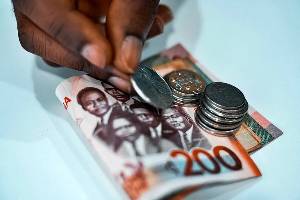The Read more recent appreciation of the Ghanaian cedi has brought some respite to a nation grappling with economic challenges. However, economists warn that this positive trend may be short-lived, rooted in temporary factors rather than a fundamental shift in the economy's trajectory.
After a tumultuous year marked by high inflation and a weakening currency, the cedi has managed to gain ground against major foreign currencies such as the US dollar, the euro, and the British pound. This improvement can be attributed to several factors, including:
- IMF Bailout: Inflows of foreign exchange from the International Monetary Fund (IMF) bailout package have provided a much-needed boost to the country's foreign exchange reserves.
- Remittances: Increased remittances from Ghanaians living abroad have also contributed to the strengthening of the cedi.
- Global Economic Stability: A more stable global economic environment has reduced external pressures on the Ghanaian economy.
While these factors have temporarily alleviated the pressure on the cedi, economists caution that they do not address the underlying structural issues that have plagued the Ghanaian economy for years.
Key Challenges and Concerns
- Import Dependency: Ghana's heavy reliance on imports continues to exert significant pressure on the cedi. The country's import bill remains high, and without a concerted effort to boost domestic production and exports, the demand for foreign currency is likely to outstrip supply.
- External Debt Burden: Ghana's substantial external debt burden limits its fiscal space and increases its vulnerability to external shocks.
- Limited Access to International Capital Markets: The country's limited access to international capital markets restricts its ability to raise funds to finance its development needs.
The Road Ahead
To ensure the long-term stability of the cedi and the overall health of the Ghanaian economy, policymakers must implement comprehensive structural reforms. These reforms should focus on:
- Diversifying the Economy: Reducing reliance on commodity exports and promoting non-traditional exports.
- Encouraging Domestic Production: Creating a conducive environment for domestic industries to thrive.
- Improving Infrastructure: Investing in infrastructure to enhance productivity and reduce costs.
- Strengthening Financial Institutions: Building a robust financial system to support economic growth.
- Fiscal Discipline: Implementing prudent fiscal policies to maintain debt sustainability.
While the recent appreciation of the cedi offers a glimmer of hope, it is crucial to recognize that sustainable economic growth and currency stability require a comprehensive and long-term approach. Without addressing the underlying challenges, the cedi's gains may prove to be fleeting.



No comments yet
Be the first to share your thoughts!